Rush Limbaugh reportedly suggested today that Sen. Ted Kennedy would be dead by the time health care reform legislation passes. “Before it’s all over, it’ll be called the Ted Kennedy memorial health care bill,” he said. A sound file containing the comment is embedded in this HuffPost news page.
We Knew This
The gist of this Anne Thompson/Daily Beast analysis piece is that Watchmen doesn’t have the moxie, the muscle or the love needed to perform strongly after this weekend. The conventional wisdom is at least $70 million by Sunday evening.
Black Coffee

Columbus & 67 Street Starbucks — post-Watchmen base where I tapped out the review (and where I’m still sitting).
Give It This Much
Watchmen‘s opening main title sequence is as nicely rendered as I’d heard, and I didn’t have a huge problem listening to Dylan’s “The Times They Are A’Changin'” as it happened. I was taken with the portion that lays out Dr. Manhattan’s (i.e., Billy Crudup‘s) history. The Dr. Manhattan full-blue-schlong footage probably will make it more routine for male genitalia to appear in mainstream movies henceforth. (Although I’m not sure that’s any kind of major blessing.) And yes, Jackie Earle Haley‘s Rorschach does deliver in a hard, tight, snarly way.
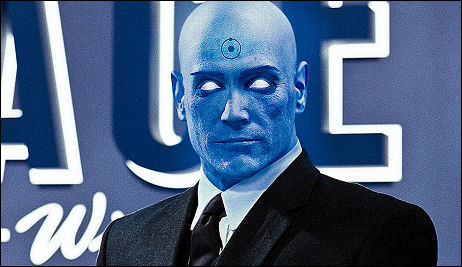
And the CG depiction, by the way, of JFK’s exploding right-temple head wound in Dallas beats Oliver Stone‘s all to hell.
But is Watchmen likable? No, it’s not. There would have to be something really wrong with you to see this thing and come out on the street beaming and saying, “Yeah… liked it! Woo-hoo!” It’s too bitter and cynical and disgusted with human nature to be “liked.” I mean, take away Patrick Wilson‘s Nite Owl/Dan Drieberg character and this is one rancid, bitter, foul-of-temper, heart-of-stone, phlegm-in-your-face, puke-in-the-gutter superhero movie, certainly in a spiritual sense.
Is it endurable in the sense you can get through all 160-odd minutes without looking at your watch three or four times? Or even once or twice? The truth is that I didn’t look at my watch once, and I took no bathroom breaks, even though I sort of wanted to.
Is it somehow enjoyable? Yes, somewhat — but again, you have to go into it prepared. You certainly have to be up on the graphic novel, the characters, their backstories, etc. Because the story is more than a little complex. And then you need to read at least a dozen negative reviews and get ready to hate it with a passion. Which is different from going in determined to hate it, which I definitely wasn’t. I went in with my eyes and pores open but at the same time prepared and willing to hate it. You know, open to this. And guess what happened?
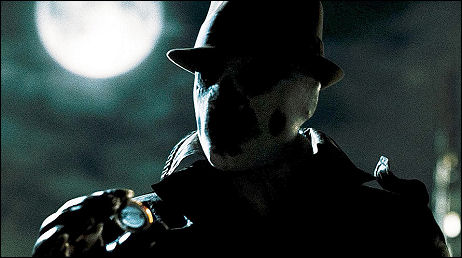
I didn’t “like” it but I didn’t hate it. And here it is an hour later and I still don’t hate it. I’m fairly certain I’ll never see it again, even on Blu-ray. It’s too much of a Gordian Knot, too exhausting, too angry, too obsessive. But at least it’s balls-out, no-holds-barred obsessive, which you have to at least respect in this age of corporate branding and capitulation.
Did director Zack Snyder err by trying to replicate the Alan Moore- Dave Gibbons-John Higgins graphic novel a little too precisely and meticulously? Maybe, but at least he went for it big-time. Would Watchmen have been better served as a twelve-part miniseries? Perhaps, but Snyder at least tried like hell to make it work as a feature, and he opened his heart, soul and veins in order to do so.
The cut Snyder turned in, I’ve read, was messed with by Warner Bros. somewhat, but it doesn’t feel as if too much of it was cut down or diluted. Watchmen may or may not be your cup of tea (it’s not mine) but at least it was made by a kind of madman who gave as little quarter as possible and didn’t muck around. I almost love the fact that Watchmen doesn’t try to make you feel “good,” and that it just tries to be itself. And give Snyder credit for giving it a fairly kapow look all through. I don’t know why I didn’t mind all the slow-mo stuff, but I didn’t. I kind of feel left out in this respect.
I emerged from the theatre feeling subdued but not seething inside. Watchmen never put a real smile on my face, but neither did it make me sit forward and groan and spread my fingers across my face. Yes, it frequently turned me off and sometimes inspired feelings of deep loathing. It provided almost nothing in the way of whole-hog satisfaction, but at least it left me feeling that I’d seen something different.
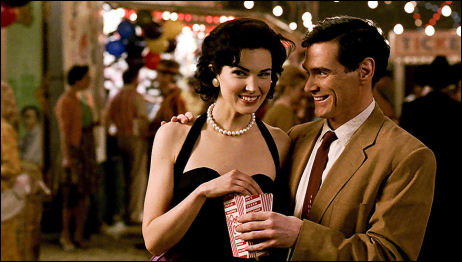
I knew going in it wouldn’t be the same old good-evil, black-white superhero hash, but I wasn’t entirely prepared for how unconcerned it would be as far as trying to charm or half-hold onto a mainstream audience.
I mean, I hated it at times. Jeffrey Dean Morgan‘s Edward Blake/The Comedian has to be one of the most loathsome and inhumane characters in history, and the Watchmen, who are supposed to be semi-good guys, spend much of the film treating him like some kind of loutish bad-brother figure. I mean, the odor just wafts off the screen from this guy. Yecch.
For all the revolting rage and purist revenge fantasies in this film, which are over-the-top vile (this is a movie that channels misanthropic fury and disdain like it’s flowing through a firehouse) and the detestable sadism and the right-reactionary political acts that the Watchmen serve (doing the bidding of Richard Nixon, Dr. Manhattan winning the Vietnam War in a week’s time by slaughtering the North Vietnamese and Vietcong like flies, Blake savagely beating up a mob of lefty-hippie protestors), not to mention the random savageries (rape, endless bludgeoning, beating the hell or the life out of adversaries)…this is finally a big-studio flick that doesn’t give a holy damn about anyone or anything except those who’ve been on board to begin with.
And I almost liked it for that. I couldn’t finally “like it, not being one of the faithful-faithful, but it has my grudging respect. But that’s all it gets.
Cohen-Hoover
HE reader “Geoffsongs” discovered last night that while while Larry Cohen‘s The Private Files of J. Edgar Hoover is not available on DVD, anyone with a Netflix subscription can watch it online through the website’s “watch instantly” feature via Starz, with the Starz intro/logo popping up just prior to the start of the movie.
Where’s Jim Hoberman‘s review? Isn’t he a longtime Cohen-head? All I can dig now are the MRQE reviews, which are mostly plans (including one from Dave Kehr).
Treadmill
Off to my 10 a.m. Watchmen IMAX screening at Leows Lincoln Plaza. Some kind of breathless-but-thoughtful reaction by 2 pm or thereabouts. I won’t catch Every Little Step at MOMA at 1:30 pm…it’s that or write. Then Tony Gilroy‘s Duplicity at 7 pm. Catch as catch can. One of those days.
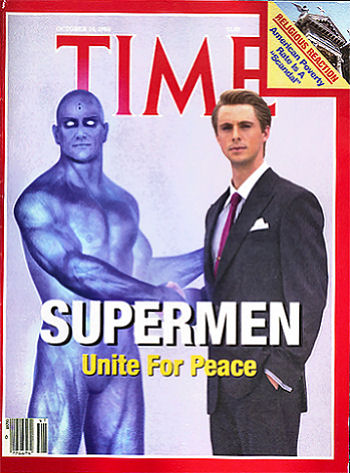
Dead Bang
“Brutality is not merely part of [Watchmen director Zack] Snyder‘s repertory of effects,” writes N.Y. Times critic A.O. Scott . “It is more like a cause, a principle, an ideology. And his commitment to violence brings into relief the shallow nihilism that has always lurked beneath the intellectual pretensions of Watchmen.
“The only action that makes sense in this world — the only sure basis for ethics or politics, the only expression of love or loyalty or conviction — is killing. And the dramatic conflict revealed, at long last, in the film’s climactic arguments is between a wholesale, idealistic approach to mass death and one that is more cynical and individualistic.
“This idea is sickening but also, finally, unpersuasive, because it is rooted in a view of human behavior that is fundamentally immature, self-pitying and sentimental. Perhaps there is some pleasure to be found in regressing into this belligerent, adolescent state of mind. But maybe it’s better to grow up.”
Hurt Again
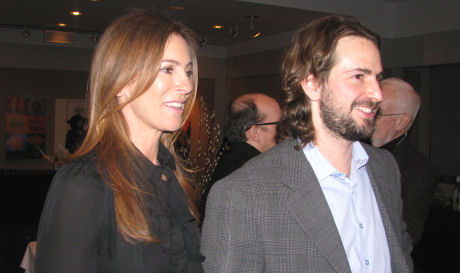
Hurt Locker director Kathryn Biglelow, screenwriter-producer Mark Boal during post-screening party at Walter Reade theatre — Tuesday, 10.24.06, 6:25 pm
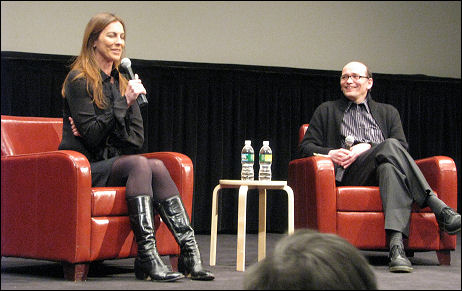
Bigelow, Film Comment editor Gavin Smith during post-screening q & a.
The Numbers
A critic friend predicted last night that Watchmen‘s Rotten Tomatoes rating — now standing at 65% positive among the grunts and 44% positive among the creme de la creme — is “going to collapse” when the regular daily critics starting being heard from tonight. (Partly, he suspects, because Warner Bros. publicists kept big-name critics waiting in sub-freezing temperatures outside of the theatre where the Manhattan all-media occured last Tuesday night.)
But you know something? 44% of the elite reviews being positive (including Roger Ebert‘s) is nothing to sniff at. The movie clearly has merit for some, and this should be respected as far as it goes. 44% is nothing to sniff at. Except…well, c’mon, we all know what a below-50% positive means in the real world out there. Be honest. And we all know what’s likely to happen after the fanboys rush in to see it this weekend.
Breach
“I grew up in the comic-book generation and still found plenty of reasons to not love Watchmen,” says Film.com’s Laremy Legel. “I don’t think it’s a generational issue. It’s more a matter of rabid fanboys vs. everyone else in the world.”

